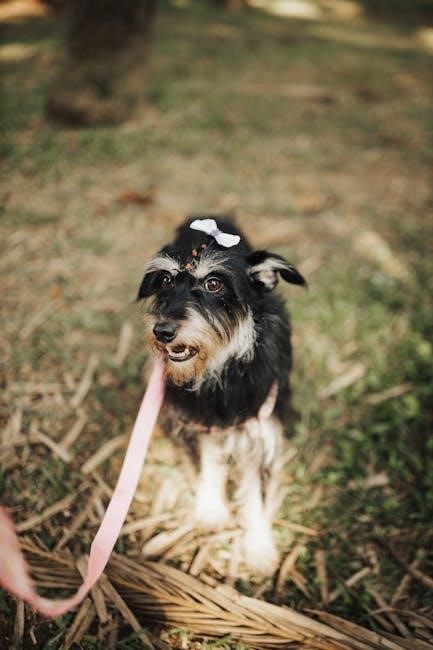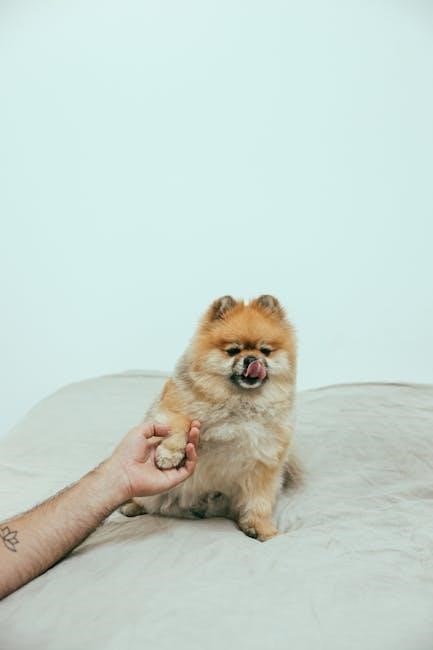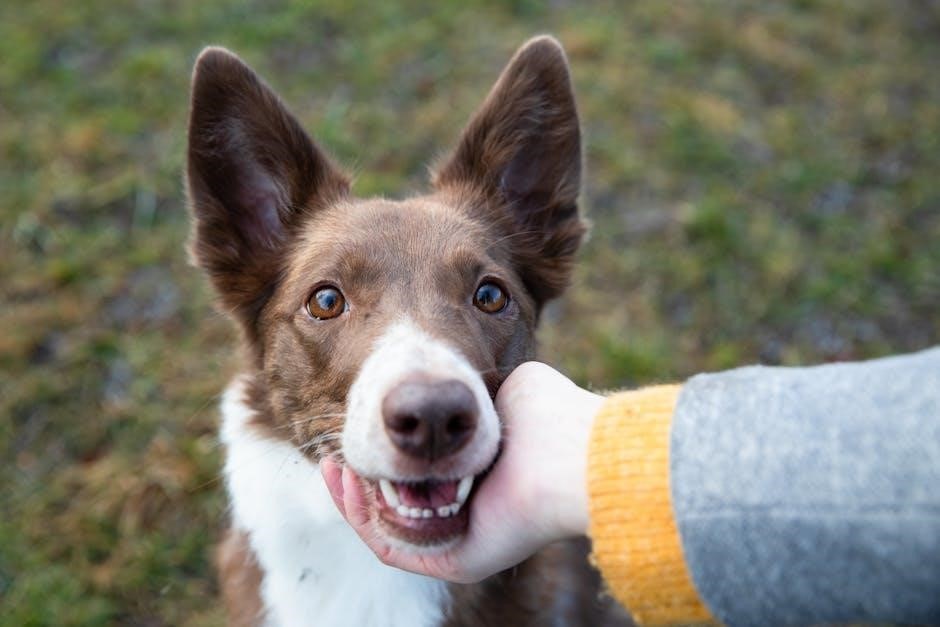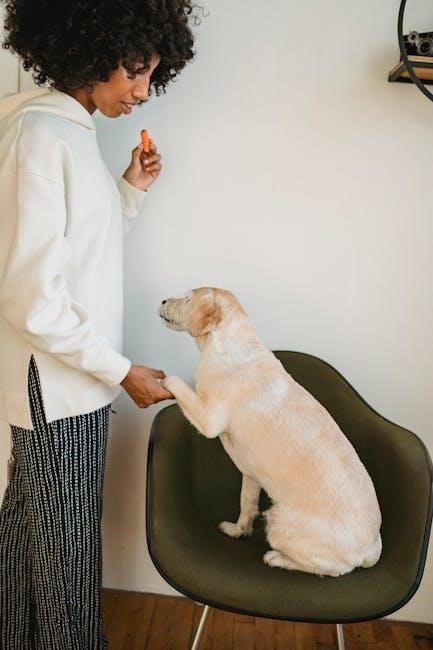
A structured puppy training schedule ensures consistency‚ covering feeding‚ play‚ training‚ and rest․ It aids in development and strengthens the bond between puppy and owner․
Why a Puppy Training Schedule is Essential
A puppy training schedule provides structure‚ helping puppies learn effectively and thrive․ It ensures consistency in feeding‚ play‚ and rest‚ reducing behavioral issues․ A clear routine helps puppies understand boundaries and expectations‚ promoting better behavior․ It also aids owners in staying organized‚ ensuring all needs are met․ By establishing a schedule early‚ you set your puppy up for long-term success‚ fostering a well-adjusted and obedient companion․
- Creates a clear structure for learning․
- Reduces confusion and anxiety for puppies․
- Helps owners stay consistent and patient․
How to Create a Comprehensive Puppy Training Plan
Creating a detailed puppy training plan involves setting clear goals and timelines․ Start by identifying your puppy’s needs‚ such as potty training‚ socialization‚ and basic commands․ Break tasks into manageable sessions‚ ensuring consistency․ Incorporate feeding schedules‚ playtime‚ and rest periods․ Tailor activities to your puppy’s age and energy levels‚ adjusting as they grow․ Track progress to stay motivated and make adjustments as needed for optimal results․
- Set realistic‚ age-appropriate training goals․
- Incorporate daily routines for structure․
- Monitor progress and adapt as needed․

Understanding Puppy Development Stages
Puppies develop rapidly‚ with distinct stages like neonatal‚ socialization‚ and adolescent phases․ Understanding these stages helps tailor training and care to their physical and emotional needs effectively․
Key Milestones in Puppy Growth
Puppies grow rapidly‚ with critical milestones at 8-11 weeks (socialization)‚ 12-16 weeks (fear imprint period)‚ and 6 months (adolescence)․ Each stage brings physical and behavioral changes‚ such as improved senses‚ independence‚ and heightened energy․ Recognizing these milestones helps owners tailor care and training‚ ensuring proper development and addressing specific needs during these formative periods․ Understanding growth phases is vital for creating an effective puppy training schedule that supports their physical‚ emotional‚ and cognitive development․
Age-Specific Training Goals
Training goals vary by age‚ focusing on socialization and basic commands for puppies under 12 weeks․ Between 12-16 weeks‚ introduce more complex commands and address fear imprint periods․ By 6 months‚ refine obedience and address adolescent behaviors․ Consistency and positive reinforcement are key at every stage․ Tailoring training to a puppy’s age ensures developmental needs are met‚ fostering confidence and good behavior․ A well-structured schedule helps owners achieve these milestones effectively‚ promoting long-term success․

Establishing a Daily Routine
A daily routine provides structure‚ including feeding‚ play‚ training‚ and rest‚ ensuring consistency and supporting a puppy’s physical and behavioral development․
Creating a Structured Schedule for Feeding‚ Play‚ and Rest
A structured schedule ensures consistency‚ with feeding times‚ play sessions‚ and rest periods clearly defined․ Puppies thrive on routine‚ which aids in potty training and digestion․ Plan 3-4 feeding times‚ short play sessions‚ and balanced rest to prevent overexertion․ Consistency helps puppies learn boundaries and reduces anxiety․ Including potty breaks after meals and play supports housebreaking․ A well-planned schedule creates a predictable routine‚ benefiting both puppy development and owner peace of mind․
Importance of Consistency in Puppy Training
Consistency is key to successful puppy training‚ providing a predictable environment that aids learning and reduces anxiety․ A regular routine helps puppies understand expectations‚ fostering good behavior and faster skill acquisition․ Inconsistent training can confuse puppies‚ slowing progress․ By maintaining a steady approach to feeding‚ play‚ and training‚ owners build trust and stability‚ which are essential for a well-adjusted‚ obedient puppy․ Consistency lays the foundation for successful housebreaking and long-term behavioral development․
Potty Training Basics
Potty training is crucial for teaching puppies to eliminate outdoors․ Consistent schedules‚ positive reinforcement‚ and supervision are key strategies to achieve successful housebreaking and avoid accidents indoors․
Effective Strategies for Housebreaking
A consistent routine is key to successful housebreaking․ Take your puppy outside immediately after meals‚ naps‚ and playtime to create a reliable schedule․ Use a designated potty area and reward your puppy with treats or praise when they eliminate correctly․ Watch for signs like sniffing or circling‚ indicating they need to go․ Crate training can also help with potty training by giving your puppy a safe space and preventing accidents when unsupervised․ Patience and positive reinforcement are essential for building good habits and avoiding setbacks․
Common Mistakes to Avoid in Potty Training
Inconsistent schedules and failing to reward successes can hinder progress․ Avoid punishing accidents‚ as this may lead to fear and setbacks․ Not providing enough potty breaks or ignoring signs can result in accidents․ Overreliance on crates without proper training can cause frustration․ Skipping praise or treats for successful potty trips reduces motivation; Incomplete cleanup of accidents may attract your puppy to the same spot․ Stay patient and consistent to avoid these pitfalls and ensure effective potty training․
Basic Obedience Commands
Essential commands like “sit‚” “stay‚” “come‚” and “leave it” form the foundation of puppy training․ Consistency and positive reinforcement help puppies learn effectively and build a strong bond․
Essential Commands for Puppy Training
Teaching basic commands like “sit‚” “stay‚” “come‚” “leave it‚” “heel‚” and “down” is crucial for establishing good behavior․ These commands provide structure and help with communication․ Positive reinforcement‚ such as treats and praise‚ encourages learning․ Consistency and repetition are key‚ as puppies thrive on routine․ Starting early ensures better absorption of instructions․ These commands also improve safety and reduce unwanted behaviors․ Incorporate them into daily training sessions for a well-behaved and responsive puppy․
Positive Reinforcement Techniques
Positive reinforcement is a powerful method for puppy training‚ focusing on rewards to encourage desired behaviors․ Use treats‚ praise‚ and play to motivate your puppy․ This approach builds confidence and strengthens your bond․ Timing is crucial—reward immediately after the action․ Avoid punishment‚ as it can cause fear and anxiety․ Consistency and patience are key․ Positive reinforcement helps puppies associate good behavior with positive outcomes‚ fostering a lifelong love for learning and obeying commands․ It’s an effective‚ humane way to train․

Socialization and Behavioral Training
Socialization introduces puppies to new environments‚ people‚ and animals‚ shaping calm behavior․ Early exposure prevents anxiety and aggression‚ fostering confidence and good manners from an early age․
How to Socialize Your Puppy Effectively
Introduce your puppy to various environments‚ people‚ and animals to foster confidence․ Start with calm‚ controlled exposures‚ using treats and praise to reinforce positive behavior․
Begin socialization between 8–11 weeks‚ as this is a critical period for development․ Consistency and patience are key to helping your puppy feel secure in new situations․
Positive reinforcement and gradual exposure ensure your puppy grows into a well-adjusted‚ calm adult dog․
Addressing Behavioral Issues Early
Identifying and addressing behavioral issues early is crucial for raising a well-adjusted puppy․ Common challenges include chewing‚ barking‚ and separation anxiety․ Consistency and positive reinforcement are key to correcting unwanted behaviors․ Introduce clear boundaries and reward good behavior with treats or praise․ Socialization plays a significant role in reducing anxiety and aggression․ Be proactive in teaching calmness and focus․ A structured training schedule helps prevent bad habits from forming‚ ensuring a smoother transition into adulthood․

Exercise and Playtime
Regular exercise and playtime are vital for a puppy’s physical and mental development․ Daily activities help burn energy‚ improve coordination‚ and strengthen the bond with your puppy․
Physical Activity Needs for Puppies
Puppies require regular physical activity to support growth and development․ A daily schedule should include exercise sessions‚ playtime‚ and rest periods to prevent overexertion․ Play helps improve coordination and burns energy‚ while structured activities like walks and interactive games strengthen the bond with your puppy․ As they grow‚ their energy levels and activity needs increase‚ requiring adjustments to their routine․ Monitoring their behavior and adjusting playtime accordingly ensures they remain healthy and well-behaved․
Playtime as a Training Tool
Playtime is a powerful training tool that combines fun with learning․ Interactive games like fetch or tug-of-war help puppies develop focus and obedience․ Using rewards during play reinforces positive behavior and strengthens your bond․ Structured play sessions can teach essential commands while keeping your puppy engaged․ Incorporating mental stimulation‚ such as puzzle toys‚ also enhances problem-solving skills․ Playtime not only burns energy but also builds confidence‚ making it a vital part of a puppy training schedule․
Health and Nutrition
Nutritional balance is crucial for puppy growth․ High-quality‚ vet-recommended diets ensure proper development․ Regular health checks and vaccinations are essential for maintaining your puppy’s well-being and preventing illnesses․
Nutritional Needs for Puppies
A balanced diet is vital for a puppy’s growth․ High-quality puppy food‚ rich in protein and nutrients‚ supports energy and development․ Feed 3-4 times daily until six months‚ then gradually reduce to twice a day․ Avoid overfeeding to prevent obesity․ Consult your vet for tailored dietary advice to ensure optimal health and avoid nutritional deficiencies․ Proper nutrition aids in strong immune systems and healthy development‚ making it a cornerstone of your puppy training schedule․
Health Checks and Vet Visits
Regular vet visits are crucial for monitoring a puppy’s health․ Schedule vaccinations‚ check-ups‚ and parasite control to ensure your puppy thrives․ Vets can detect potential issues early‚ preventing serious problems․ Discuss dietary needs‚ growth milestones‚ and training tips during visits․ A consistent partnership with your vet ensures your puppy receives tailored care‚ supporting their overall well-being and development․ Early health screenings and advice help create a strong foundation for a healthy‚ happy life․
Sleep and Nap Schedules
Adequate rest is vital for puppies․ Establish a bedtime routine‚ crate train‚ and ensure your puppy feels secure nearby․ This promotes healthy development and prevents hyperactivity․
Importance of Adequate Rest for Puppies
Adequate rest is crucial for puppies‚ as it supports physical growth and mental development․ Puppies need plenty of sleep to recharge‚ with younger pups requiring up to 18-20 hours of rest daily․ Overexertion can lead to hyperactivity and behavioral issues․ A consistent sleep schedule helps regulate their energy levels and ensures they are calm and focused during training sessions․ Crate training can aid in establishing a bedtime routine‚ providing a safe space for your puppy to rest and feel secure․
Creating a Bedtime Routine
Establishing a bedtime routine helps puppies wind down and prepares them for rest․ Start by taking your puppy outside to ensure they empty their bladder and bowels․ Use calming commands like “settle” to signal it’s time to relax․ Dim the lights and minimize noise to create a soothing environment․ Place their crate in your bedroom to provide a sense of security․ Avoid heavy play or stimulation before bed․ Consistency in the routine aids in developing good sleep habits and reduces nighttime disruptions․